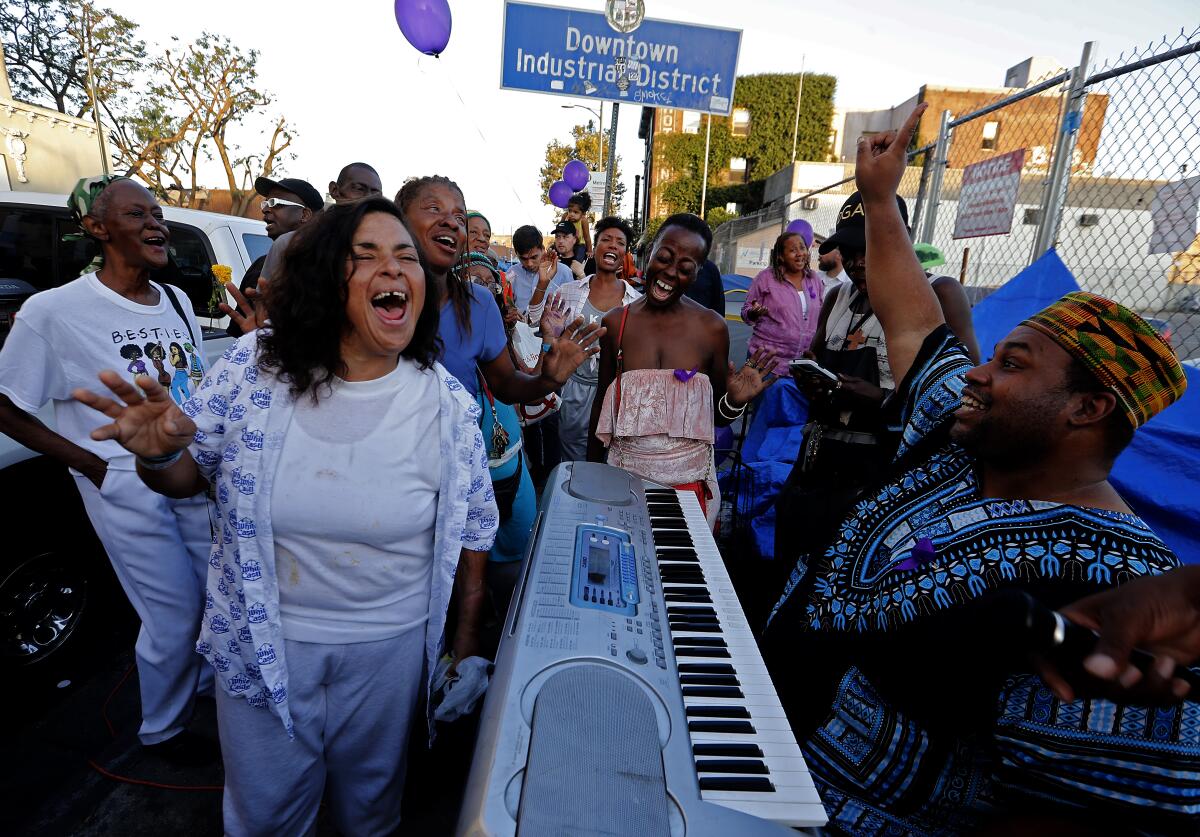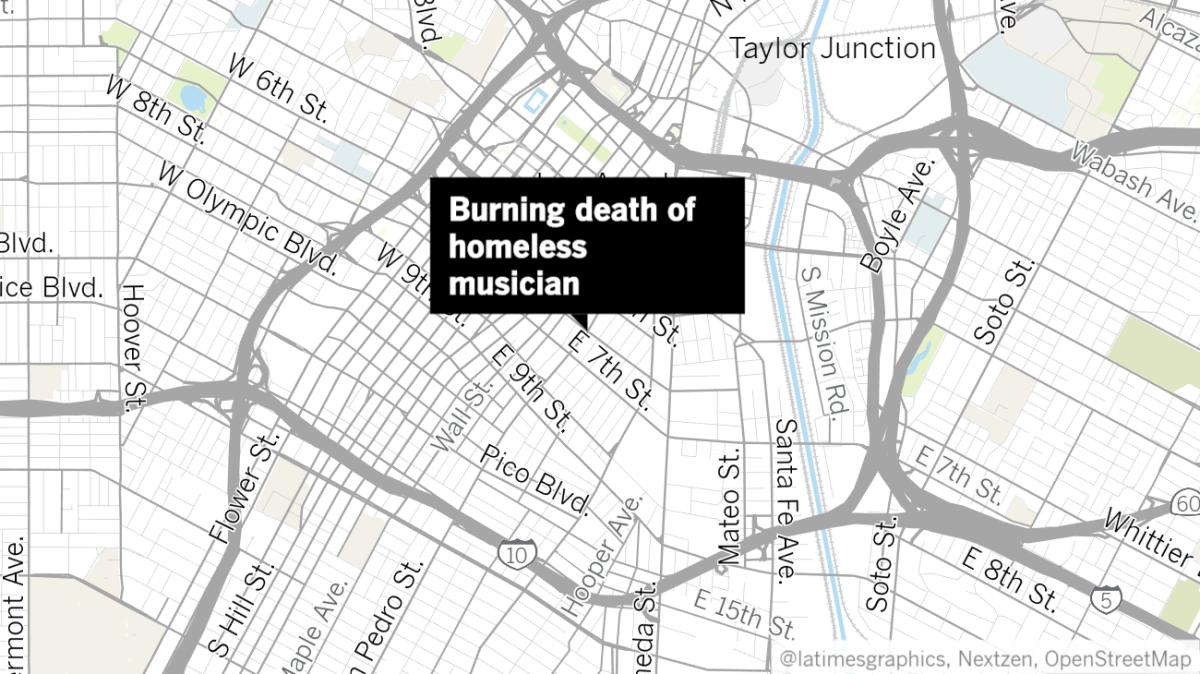Friends gather to recall the skid row guitarist who died when his tent was set ablaze

- Share via
Even after years spent bouncing in and out of apartments and back into homelessness, Dwayne Fields always found solace in his six-string, friends said.
The beloved musician and mentor could often be seen with an acoustic or electric guitar in hand near 6th and San Pedro streets in downtown Los Angeles’ skid row, strumming blues riffs that one friend swore sounded identical to those of Fields’ idol, Jimi Hendrix.
“Through arts and culture, through his music making, through his guitar playing, he was bringing the community together,” said Pete White, executive director of the Los Angeles Community Action Network, a skid row advocacy group.
The skid row community has spent this week mourning the loss of its soundtrack, however, after police say Fields became the victim of a grisly crime late Monday night.
Fields, 62, was inside his tent around 11:30 p.m. when, prosecutors allege, another man set his living quarters ablaze. Responding officers found Fields walking down 6th street, his body still burning, according to two law enforcement officials who spoke on condition of anonymity to discuss the case candidly.
The officers tried desperately to extinguish the flames, but Fields died of his injuries Tuesday morning, leaving skid row without one of its most vibrant presences.
“Our community has lost a great spirit, a great individual,” said General Jeff Page, an activist and fixture in the skid row community.
Jonathan Early, 38, was charged Wednesday with capital murder in connection with Fields’ death. Investigators have not offered a motive in the slaying or explained how the fire was set. It remains unclear if Early and Fields knew each other, but one law enforcement official told The Times that Early was also homeless.
Early did not enter a plea during a brief court appearance in downtown Los Angeles on Wednesday, and his public defender declined to comment. During the appearance, Deputy Dist. Atty. Joy Roberts said Early was captured at the scene Monday night and identified by eyewitnesses as the man who set the blaze.
The attack is part of a recent spasm of violence in skid row. Four people, including a social worker and a security guard, were shot in San Julian Park last week after a dispute erupted on the sidewalk. Earlier this month, a 59-year-old homeless man was beaten to death with a pipe during a robbery.
About three dozen people clutching purple balloons and purple roses — in memory of their friend’s love of “Purple Haze” — gathered Wednesday night to remember Fields.
Angela James, deputy director of finance and operations at Los Angeles Community Action Network, said at the vigil that she met Fields when she started working with the organization about a year and a half ago. Since then, she saw him almost every day.
James never learned much of Fields’ life story — she knew he was from Flint, Mich., and had played with bands in L.A. and Las Vegas — but she grew to look forward to hearing him play his guitar every Thursday at the farmers market hosted by the community action network.
“Some days we’d have a song together, and some days we’d just talk,” she said.
The group of mourners walked from Los Angeles Community Action Network a few blocks to the southeast corner of Sixth and San Pedro streets, where Fields had lived with his longtime partner Valarie Wertlow. What two nights earlier was a crime scene became a living memorial to Fields.
Alongside Wertlow’s belongings were three pictures of her companion of two decades. Paper printouts of Fields’ smiling face were attached with paper clips to the chain link fence that backstopped her home.
Speakers were set up. A keyboard was plugged in. And Fields’ friends sang “A Change Is Gonna Come,” “Bridge Over Troubled Water” and “Amazing Grace.” Wertlow led the group in singing “Lean On Me.”
Wertlow said mutual attraction helped start their relationship, but it was Fields’ kindness that kept them together.
“If you needed anything ... he had it,” she said. “He had you.”
And now, Wertlow said, she has him.
“I have to be his strength on earth. He’s not gone. He’s just out of this physical world,” she said. “But I’m gonna take him wherever I go.”

Skid row activists said there has been a rash of tent fires in the downtown area in recent weeks. Page said two or three blazes were set in the same intersection where Fields was attacked just a few days ago.
“Oftentimes, those tent fires can be started for something as small as a dispute over the land you’re occupying,” White said.
Fields was actively involved in LA CAN, performing alongside the group’s band and its “freedom singers,” and had previously played with a Jimi Hendrix tribute group, White said. Those who knew him said Fields was grateful for any opportunity to perform, no matter the size of the crowd.
“Every time I saw him he was talking to somebody with a gleam in his eye, excited he was going to play a show ... that was just his thing,” Page said. “It was like breathing to him.”
Fields lived in the area near 6th and San Pedro sporadically for about five years, White said. He had been able to find housing several times but struggled to stay off the streets for long because most buildings could not also provide shelter for Fields’ girlfriend, who suffers from “mobility issues” due to a medical condition, White said.
“The problem was his partner who was still out there. They could never find accommodations for a couple, which is one of the big problems with our ... system of providing services,” White said. “There are very limited opportunities for single individuals and even less so for partners.”
Page said Fields’ struggles to find housing are emblematic of a broader problem in skid row.
“You’ve got a lot of families that are stuck on the sidewalk because they want to stay together,” he said. “There’s situations like this where, to me, the skid row infrastructure is to blame, because it’s not accommodating the needs of human beings and natural human family systems.”
White said he hopes people remember Fields’ for his talent and his personality, rather than where he slept and died.
“He was much more to us than a transient person, than a homeless person, in skid row,” White said.
Times Staff Writer Richard Winton and Jaclyn Cosgrove contributed to this report.
More to Read
Sign up for Essential California
The most important California stories and recommendations in your inbox every morning.
You may occasionally receive promotional content from the Los Angeles Times.











